Five reasons Trump still tops the polls
- Published
- comments
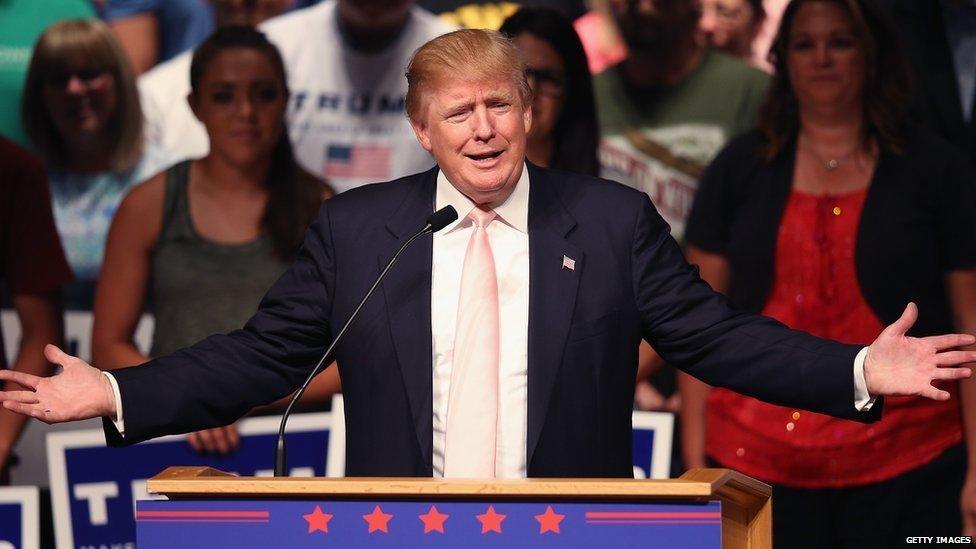
If Donald Trump's presidential bid is dead, no one bothered to tell Mr Trump - or his supporters.
Just a week ago, following the New York billionaire's mocking comments about 2008 Republican nominee John McCain's Vietnam POW experience, pundits and prognosticators were busy etching his political epitaph.
"The circus is almost over," Republican strategist Rick Wilson said, external in Politico. "My advice to Trump fans? Don't be the last clown out of the tent."
The previous Republican nominee Mitt Romney blasted, external Mr Trump, as did current candidates Jeb Bush, Scott Walker and Lindsey Graham.
All that was left was to wait for the latest poll results to come in and see exactly how precipitous Mr Trump's fall would be.
Naysayers are going to have to wait a bit longer, it seems. A CNN/ORD national survey, external conducted entirely after the McCain dust-up, for instance, puts Mr Trump ahead with the support of 18% of Republicans, Mr Bush at 15% and Mr Walker at 10%.
So, how to explain Mr Trump's enduring appeal? Here are five possible factors at play.

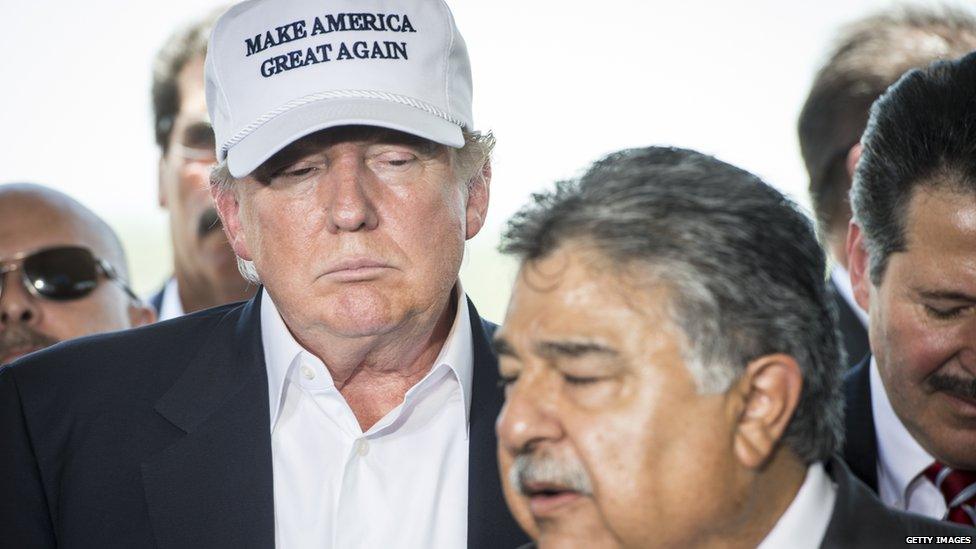
Donald Trump has become the darling of anti-immigration conservatives
1. The voice of the anti-immigration cause
Immigration has become a centrepiece of Mr Trump's campaign thanks to the over-the-top rhetoric in his kick-off speech in New York, where he accused Mexico of "bringing drugs, and bringing crime, and their rapists" to the US.
While his views were condemned as extreme and racially tinged, his immigration stance appears to be resonating with a significant portion of the Republican primary electorate.
According to that CNN/ORC survey, 63% of Republicans support deporting the estimated 11 million illegal immigrants in the US. Of that number, 23% back Mr Trump, while only 10% support second-place Bush.
"It is immigration - its universally celebrated benefits and its barely acknowledged costs - that is the third rail of US politics," writes, external Matthew Continetti for the Washington Free Beacon. "Trump didn't step on the third rail; he embraced it, he won't let go of it, and in so doing he's become electric."
The irony, however, is that before and after his bombastic comments, Mr Trump has offered more moderate views, external on the issue, including endorsing the possibility of a "merit-based system" that would allow a pathway for some undocumented immigrants to remain in the US.
That sounds a lot like Mr Bush's views, in fact. But Mr Trump made a big splash with his anti-immigration comments - and for conservatives who care about the issue, he's become their guy.

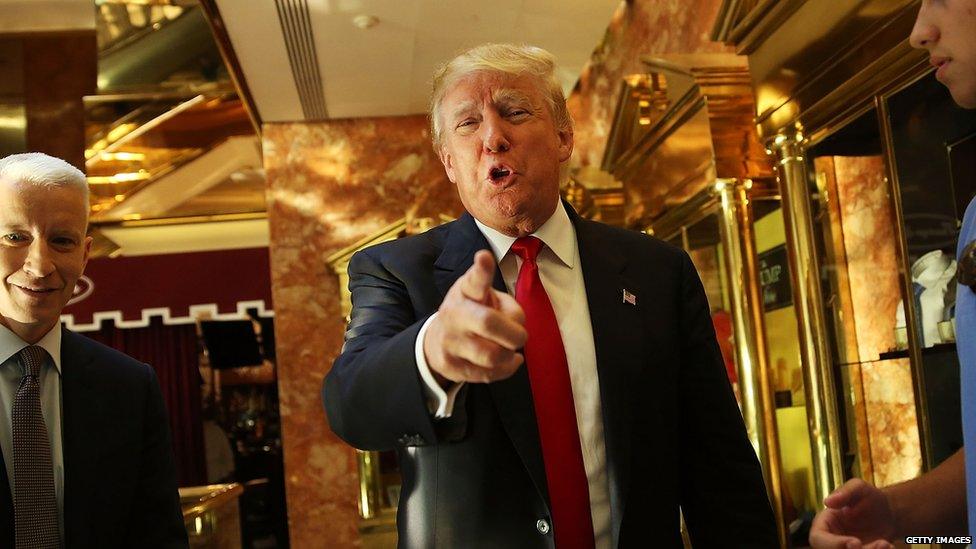
Donald Trump has boasted that, as a businessman, he knows how to create jobs
2. A man with business bona fides
Although immigration has dominated Mr Trump's media coverage, the CNN poll reveals that it's not nearly the most important subject for Republican voters.
Neither is foreign policy, which has been a staple of Republican candidate stump speeches all year.
According to the CNN poll the issue that a 44% plurality of Republicans care about is the economy.
Although unemployment is dropping and the stock market continues to rise, many Americans still worry about their financial bottom line - particularly when it comes to wage stagnation and the growing gap between the middle class and the super-wealthy. That's showing up in the rhetoric not only of Democrats, but also of many Republican candidates.
Unlike other candidates, however, Mr Trump can boast of his business experience and use it as a cudgel against his adversaries
"A number of my competitors for the Republican nomination have no business running for president," Mr Trump wrote, external in a 19 July USA Today op-ed. "I do not need to be lectured by any of them. Many are failed politicians or people who would be unable to succeed in the private sector."
Mr Trump says he'll be the "best jobs president that God ever created". According to, external Madison Gesiotto of the Washington Times, that message is resonating - particularly with younger voters who are struggling to make headway in the modern workplace.
"If those younger voters believe he will deliver those jobs, God help the rest of the GOP field," he concludes.
God help them indeed.

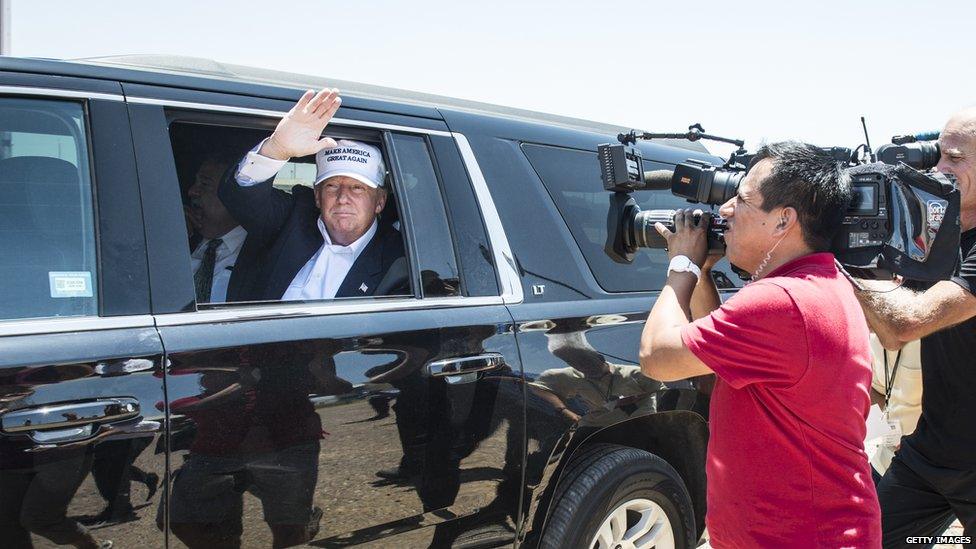
Donald Trump knows how to make an entrance
3. America loves a celebrity
Mr Trump has been plastering his name on everything he touches - from New York towers to California golf courses to airplane tailfins - for decades. He was the star of his own reality television show, and his catchphrase - "you're fired" - has entered the cultural zeitgeist.
In other words, Mr Trump has the kind of name recognition of which politicians like Ohio Governor John Kasich and Wisconsin's Walker can only dream. A recent Gallup poll, external puts Mr Trump's name ID among Republicans at 92%. CNN's poll found only 1% of Americans had never heard of the man.
Mr Trump's visibility, combined with his headline-grabbing entry into the Republican race, has created a kind of positive feedback loop of political success. His name recognition spurs media coverage, which boosts his poll numbers and leads to more media coverage.
George Washington University Prof John Sides explains, external how this process plays out.
"When a pollster interrupts people's lives and asks them about a presidential primary that doesn't formally begin for months, a significant number of people will mention whichever candidate happens to be in the news these days," he writes in the Washington Post.
Sides and UCLA Prof Lynn Vavreck say this is a familiar cycle in US politics, with an early boom in standing usually followed by a steady decline, as candidates undergo media scrutiny.
Is it a fate that awaits Mr Trump? If it isn't, it could be because …

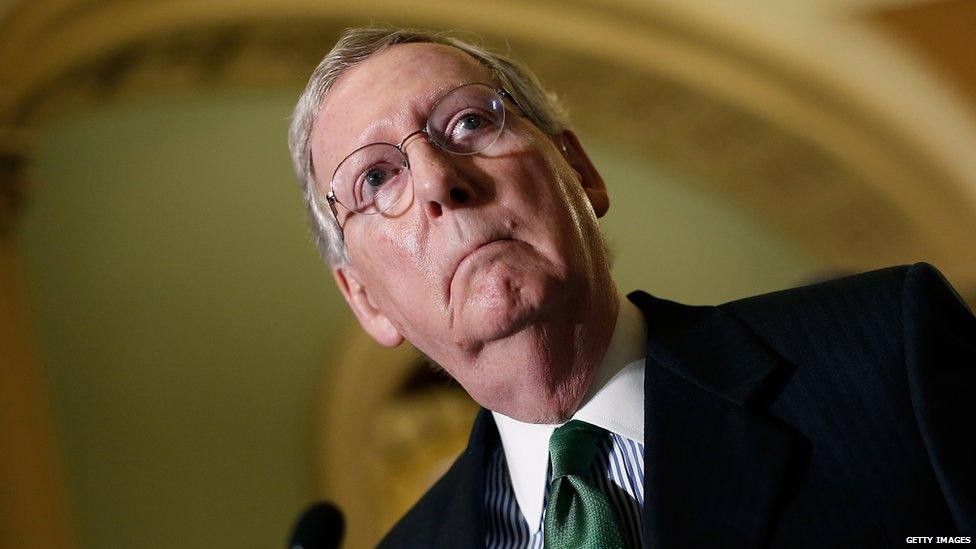
Many conservatives aren't happy with Senate Majority Leader Mitch McConnell and congressional Republicans
4. The Republican establishment's nemesis
Part of the reason Mr Trump's attacks on Mr McCain haven't seemed to damage his standing is because the long-time Arizona senator embodies a Republican Party Washington elite that is haemorrhaging support even among the conservative faithful.
A recent Pew survey puts the party's favourability among its own members at 68% - the lowest it's been in more than two years.
All of this has led to a fair amount of hand-wringing among conservatives, who look at the Republican congressional leadership's inability to take a more confrontational stands on issues like the Iran nuclear agreement and shuttering the Export-Import Bank and wonder just what their 2014 mid-term election victories got them.
"When given the opportunity to put good policy into place, or to take steps to make such policy more feasible in the future, where is the Republican Party to be found?" asks, external the Federalist's Ben Domenech.
Cue Donald Trump, who enters the presidential race like a battleship, with fusillades in all directions. He says what he thinks and seems constitutionally unable to apologise.
According to the CNN poll, 25% of the respondents who said it's "extremely important" that a candidate stand up for his or her beliefs in the face of criticism support Mr Trump. Mr Bush is a distant second at 11%.

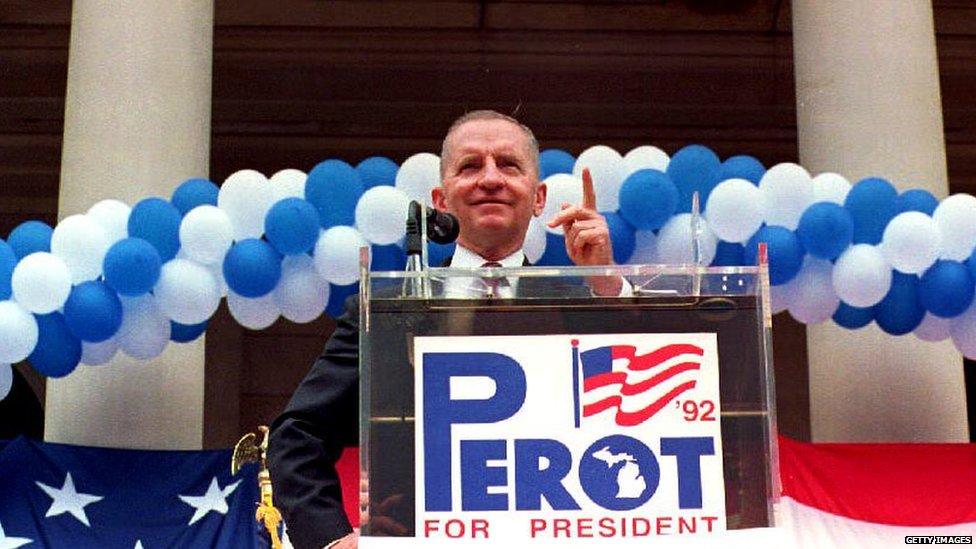
Donald Trump isn't the first outspoken businessman to run for president
5. The latest "silent majority" spokesman
Here's another bit of insight from that CNN poll. Just 16% of Republicans feel like they're represented in Washington - those that don't support Mr Trump by a sizeable margin (24%, compared to 13% for Jeb Bush and single digits for the rest of the Republican field).
Mr Trump is appealing to what Victor David Hanson of PJ Media calls, external the fed-up crowd.
"The fed-up crowd likes the payback of watching blood sport in an arena where niceties just don't apply anymore," he writes. "At least for a while longer, they enjoy the smug getting their comeuppance, as an uncouth, bull-headed Trump charges about, snorting and spearing liberal pieties and more sober and judicious Republicans at random."
The Free Beacon's Continetti paints a similar picture, calling Mr Trump's supporters the "radical middle", who in years past embraced Ronald Reagan, Pat Buchanan, Newt Gingrich and Ross Perot (another wealthy businessman who made his bones railing against a Mexican threat).
"That Trump is not a conservative, nor by any means a mainstream Republican, is not a minus but a plus to the radical middle," he continues. "These voters are culturally right but economically left; they depend on the New Deal and parts of the Great Society, are estranged from the fiscal and monetary agendas of the Economist and Wall Street Journal. What they lack in free market bona fides they make up for in their romantic fantasy of the patriotic tycoon or general, the fixer, the Can Do Man who will cut the baloney and Get Things Done."
Mr Trump himself calls his supporters "the silent majority" - a label first coined by President Richard Nixon in 1969.
"There's a silent majority out there," Mr Trump said, external in South Carolina last week. "We're tired of being pushed around, kicked around, and acting and being led by stupid people."

- Published23 July 2015
- Published21 July 2015
- Published16 June 2015
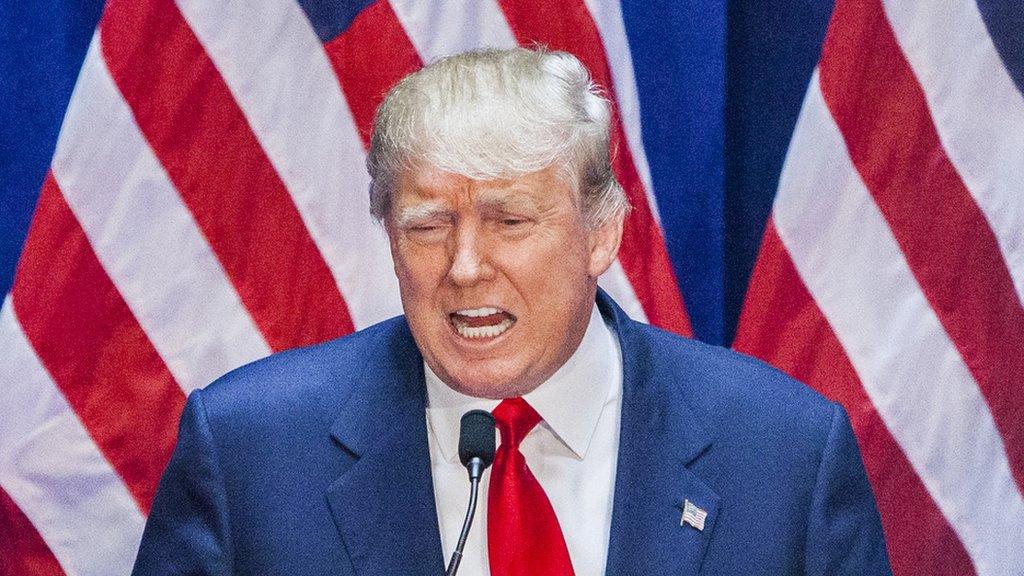
- Published13 July 2015